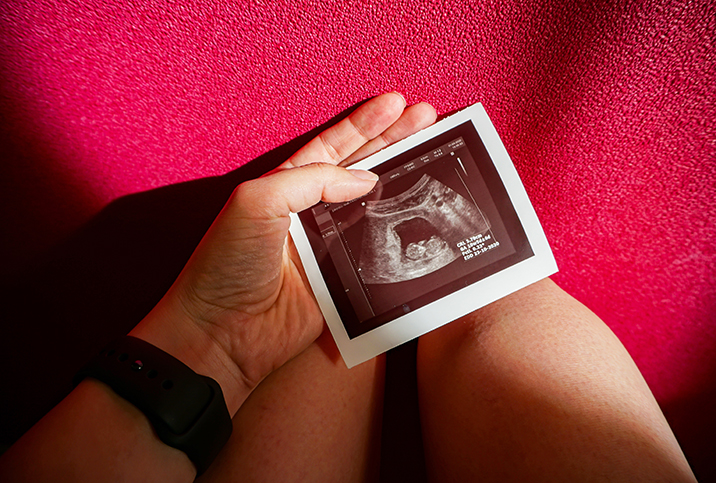How Miscarriages Are Diagnosed and How Some May Be Prevented

Defined as early pregnancy loss before the 20th week of gestation, miscarriages affect an estimated 10 percent to 20 percent of pregnancies, according to Mayo Clinic.
Miscarriage is the most frequent form of pregnancy loss and is met by symptoms such as cramping and vaginal bleeding. While a miscarriage is never someone's fault, there are underlying causes behind it.
Sometimes it may be difficult for a healthcare provider to pinpoint a specific reason, but there are steps pregnant women can take to help lower their chance of a miscarriage.
Symptoms of miscarriages
"Symptoms of a miscarriage can range from severe cramping and bleeding to having no symptoms at all," explained Beth Zhou, M.D., a reproductive endocrinologist and board-certified OB-GYN at CCRM Fertility in Houston.
When someone has experienced a pregnancy loss but no symptoms, it's called a missed miscarriage.
Other miscarriage symptoms include passing pregnancy tissue through the vagina, clear or pink vaginal fluid, and dizziness and faintness. Cramping can also occur in the lower back. Pregnancy symptoms, such as breast tenderness and nausea, may start to fade.
There are also various kinds of miscarriages met by specific symptoms, such as a threatened miscarriage, which can cause cramping or bleeding.
Other symptoms specific to different kinds of miscarriage include the following:
- Increased bleeding with an inevitable miscarriage
- A complete miscarriage, where all of the pregnancy tissue is passed
- An incomplete miscarriage, where only a portion of the pregnancy tissue passes
How long a miscarriage lasts can depend on the length of the pregnancy. Most miscarriages last a few days to a few weeks.
"Miscarriages may last up to two weeks if the pregnancy is passing on its own. This can be an extremely difficult time, both physically and emotionally," Zhou explained.
When someone waits for a miscarriage to continue on its own without treatment, it's called expectant management.
However, treatment options are available for all types of miscarriages.
"There are medical and surgical options that are available for managing miscarriages that the OB-GYN can discuss as other options to manage the miscarriage. It is important to have support during this loss and to be kind to yourself as you grieve and recover," Zhou said.
Acquiring an infection from a miscarriage is rare but requires immediate care. Other complications include heavy vaginal bleeding or soaking through a pad every two hours, a fever higher than 100 degrees Fahrenheit, and severe pain.
If someone experiences these complications, they should call their doctor immediately.
Diagnosing a miscarriage
Usually, someone can suspect they are having a miscarriage at home. To confirm a miscarriage, schedule an appointment with your doctor for a diagnosis.
"Miscarriages are diagnosed mostly with ultrasounds that can verify that a pregnancy that was there previously is no longer viable," Zhou said.
A provider may run various tests, such as a pelvic exam or a blood test. Testing for the hormone human chorionic gonadotropin (hCG) could point to a miscarriage; lower levels are associated with the potential for pregnancy loss.
Early in a pregnancy, a miscarriage may take longer to confirm.
"An intrauterine pregnancy should be visible on ultrasound by about six weeks gestation," Zhou explained. "If there are no symptoms of a miscarriage but the pregnancy is not measuring the size that is expected, it may take one to two weeks to confirm if someone is having a miscarriage. Oftentimes, pregnancies do not measure the right size but may simply be due to delayed ovulation and are actually normal pregnancies."
There is no way to stop a miscarriage from occurring, although some studies suggest that low hCG levels can detect a potential miscarriage. Unfortunately, a provider cannot medically intervene to prevent a miscarriage.
Causes of miscarriages
Miscarriages can occur for a multitude of reasons.
"The most common reason is because an egg or a sperm carrying the wrong number of chromosomes meet each other," Zhou said.
This is sometimes called a chromosome error, which occurs within the embryo. Molar pregnancies and partial molar pregnancies are both chromosomal issues and lead to nonviable pregnancies. Chromosomal errors are out of someone's control.
Age is a risk factor for miscarriage as well.
"The biggest predictor of miscarriage is, unfortunately, the age of the female's eggs," Zhou said. "The frequency of miscarriages among females between 20 to 30 years old is around 15 percent, whereas this number increases to 80 percent in 45-year-olds."
Abnormalities or underlying conditions can also cause miscarriages.
"Another common reason is because of abnormalities in the uterus that a female is born with, like a uterine septum, or that develop over time, like fibroids. Hormonal imbalances, like thyroid disease and uncontrolled diabetes, can also increase the risk for miscarriages," Zhou said.
Health conditions such as infections and some autoimmune disorders increase the risk of miscarriage.
"Having a prior miscarriage also increases the risk that another one may occur, but statistically, the odds of having a live birth are higher than having a miscarriage, even with a prior miscarriage," Zhou said.
Only a minuscule number of people have recurrent miscarriages.
While having concerns during pregnancy is normal, activities such as sexual intercourse, stress, exercise or prior use of birth control before pregnancy do not cause miscarriage.
Preventing a miscarriage
"Unfortunately, because most miscarriages occur from the wrong number of chromosomes, there is not a great way to prevent miscarriages," Zhou said.
However, other common underlying causes of miscarriages, when treated, can help prevent a miscarriage in the future.
"If there are known anatomic reasons for miscarriages, like fibroids or uterine septums, these can be surgically corrected," Zhou explained.
Lifestyle also plays a role.
"Ensuring a healthy lifestyle free of illicit drugs, smoking and alcohol can reduce the risk of miscarriages," Zhou said.
Recurrent miscarriages should warrant closer medical attention to potentially identify an underlying cause.
"Females who experience more than two miscarriages should seek an appointment with their OB-GYN to investigate other rarer causes of recurrent pregnancy loss, as these may be corrected," Zhou said.
Miscarriage is a relatively common experience, and most people who have miscarriages can have successful pregnancies in the future.
While many factors can cause a miscarriage, the most common cause—an abnormal amount of chromosomes—is never someone's fault.


















